-1747125748.jpeg)
KATHMANDU: Federation of Nepalese Chambers of Commerce and Industry (FNCCI) has suggested that the budget for fiscal year 2025/26 include an investment decade, an integrated investment body with related laws, policies to boost local production and import substitution, policy stability and special tourism programmes targeting neighbouring countries.
At a pre-budget interaction organised by the FNCCI in Kathmandu on Sunday, FNCCI President Chandra Prasad Dhakal handed over the suggestions to Deputy Prime Minister and Minister for Finance Bishnu Prasad Paudel.
Speaking on behalf of the government, Minister Paudel said, "The government is clear that the country's economy cannot move forward without attracting investors. Therefore this government, from the very beginning, consulted with the private sector to overcome the economic slowdown and made policy reforms through ordinances. However, that is not enough. We will gradually make improvements." He also confirmed his commitment to gradually implement the report of the High-level Economic Reforms Recommendation Commission.
FNCCI President Dhakal stressed that the budget should address the complex international environment, the country's needs and public disappointment. "We recommend reducing general expenditure and increasing development expenditure, as well as introducing programmes to boost the purchasing power of the general public and the productivity of entrepreneurs," he said. He added, "An integrated law related to investment, a single facilitation and regulatory body and integrated services are a necessity. The second priority is to declare 2025-2035 as the investment decade."
Dhakal also called for reforms in environmental assessments and procedures regarding the extraction, sale and distribution of aggregates, while suggesting measures to promote tourism. He proposed enhanced infrastructure such as access roads and electricity for hotels, resorts, educational institutions and teaching hospitals in hill stations, along with a 50% income tax exemption for the first five years. He further recommended revising the provision for Indian tourists, allowing them to bring up to $5,000 in convertible currency instead of only INR 25,000.
On the occasion, FNCCI Senior Vice President Anjan Shrestha pointed out, "Even though there is a constitutional provision to bring the budget on a fixed date so that the budget can come on time, improvement in capital expenditure is not seen. Therefore, it seems that there is a problem in the budget cycle itself, such as budget formulation, allocation, implementation and monitoring and evaluation. It is necessary to find a long-term solution to this."
Similarly, FNCCI Tax and Revenue Committee Chairperson Ambika Prasad Paudel said, "The biggest problem in Nepal's budget process over the past two decades has been the inability to spend capital expenditure." She stressed the need for an implementable budget with policy reforms that will stimulate market demand and foster private sector growth.
The FNCCI proposals also call for measures to strengthen policy transparency, enhance good governance and create an environment in which entrepreneurs and businesspersons can operate with dignity, thereby boosting both domestic and foreign investment.






